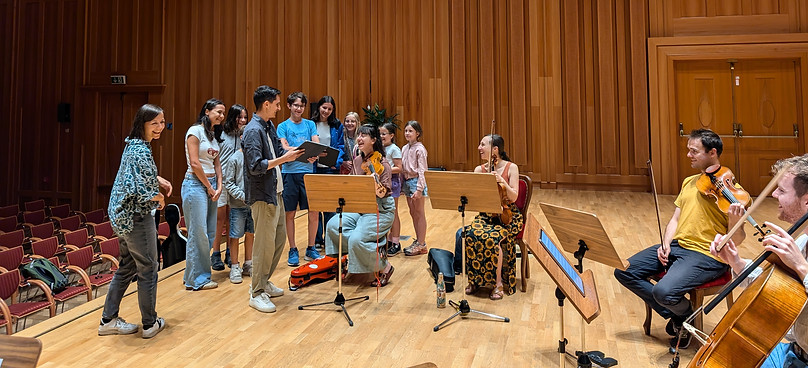
Taking Mahler back to the Alps
Each summer, Orchestra for the Earth retraces Gustav Mahler’s Alpine footsteps — bringing his music back to the landscapes that first inspired it, and sharing it through concerts, education projects and pioneering sustainable touring.
Since 2017, we’ve performed in the three mountain towns where Mahler composed his symphonies, as well as other places that shaped his life and the work of fellow composers drawn to the Alps. Together they form a musical landscape — from lakeside huts and mountain chapels to open-air stages and concert halls — all linked through a single journey.
The Alpine Tours have grown into a living tradition: a meeting of art, nature and community that combines world-class performance with a deep environmental purpose. Mahler found in these mountains the silence and splendour that shaped his musical world. Performing his works — and those of other composers who loved this region — amid those same forests and lakes reveals something profoundly human about their music: how creativity, learning and the natural world feed one another. That idea sits at the heart of all we do.
Want to know more? Check out this article by our founder, John Warner, about what the tour means to him.
Watch: a glimpse of our 2021 tour, featuring Mahler’s Resurrection Symphony in a visceral arrangement for septet.

Gustav Mahler's Field of Flowers
The Alpine Tours are not only about revisiting Mahler's music — they’re about protecting the landscapes that inspired it.
Working with the Naturpark Attersee–Traunsee, OFE founded a nature reserve near Mahler’s composing hut in Steinbach am Attersee: Gustav Mahler’s Field of Flowers. Opened to the public in 2019, the meadow is funded by donations from our concerts and supports the extraordinary biodiversity of Mahler’s beloved countryside.
Visitors can wander among native Alpine species — orchids, gentians, and mountain clover — and learn about the fragile ecosystems they sustain. It’s a living tribute to Mahler’s ecological sensibility and a reminder that the beauty he celebrated depends on our care.

Music for the Next Generation
Out of the Alpine Tours has grown a wider creative education project: Gustav Mahler’s Sounds of Nature. Each year, our musicians work with local children to explore the soundscapes that inspired Mahler — the birdsong, the streams, the shifting light and air of the mountains.
Together, we listen, play and create. The children record OFE musicians as well as natural sounds from the surrounding countryside, weaving these into short pieces of their own and discovering how music can grow directly from the world around them. The project culminates each summer in a small open-air performance beside one of Mahler’s composing huts, where their creations are shared alongside OFE’s and followed by a tree-planting.
Sounds of Nature is now a living part of every Alpine Tour — a playful, hands-on way of passing on Mahler’s love of the natural world and showing that caring for the planet begins with listening.


Touring sustainably
Touring is one of the most powerful ways musicians can share our message, collaborate with communities and reach new audiences — but it also carries a heavy environmental cost. From our very first journey, we’ve been determined to prove that orchestral touring can be done differently — and that travelling responsibly can deepen the artistic experience rather than diminish it.
We tour with a small ensemble, typically between seven and twenty-five musicians. This light footprint reduces emissions dramatically and opens doors to smaller venues in remote, beautiful places — settings that once inspired composers but rarely hear their music today. When larger forces are needed, we partner with local orchestras, creating exchanges that strengthen musical and cultural ties. We also travel without our own crew or technical equipment, working instead with local technicians and stage managers wherever we go.
All our travel to, from, and around the Alps is by land. Europe’s excellent rail and road networks make it easy — and far more sociable — to move together by train and coach, watching the landscape unfold as we go. Avoiding air travel removes the logistical headaches of flying with large instruments and gives the musicians time to rest, reflect, and connect.
Each route is planned with care, keeping distances short and schedules efficient. That means less fatigue, stronger performances, and more time in every community we visit. Often we stay for several days, performing multiple programmes and running environmental or educational projects — turning each stop into a genuine exchange, and part of a continuous journey between people, music, and place.
